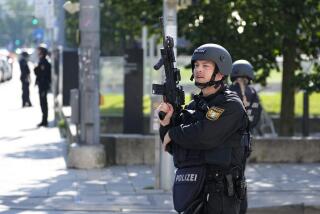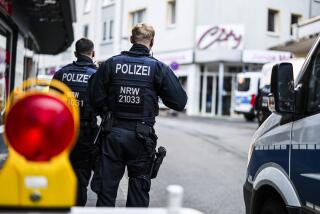Berlin Police Hunt Clues in Bombing That Killed GI
- Share via
WEST BERLIN — Police on Sunday began a painstaking search of rubble from a discotheque frequented by American servicemen, hoping to find clues about who planted the bomb that killed two people and injured more than 200.
At least 70 people, most of them in their 20s, remained hospitalized--suffering from burns, broken limbs and ruptured eardrums from the blast, which ripped through the crowded club early Saturday.
U.S. and West German authorities have said they believe that the bombing was politically motivated, aimed at American servicemen, but there was no hard evidence to link the attack with any specific group.
The bombing, which killed a 21-year-old U.S. soldier and a 29-year-old Turkish woman, followed rhetoric by Libya’s leader, Col. Moammar Kadafi, to the effect that every American was a target as a result of last month’s confrontation between U.S. and Libyan forces in the Gulf of Sidra.
The West German Foreign Ministry announced Sunday that it has formed a special unit to follow up any police evidence that might link the discotheque bombing to a foreign government.
Dieter Piete, the police official heading the Berlin investigation, said that six telephone calls have been received so far, all claiming responsibility for the attack on behalf of various political organizations. The claims, he said, contained only widely known information and were most likely false, adding, “They just make our job more difficult.”
Meanwhile, police carted away tons of rubble from the discotheque, La Belle, which was on the ground floor of a six-story building in the Schoeneberg district of the city. The rubble was taken to a police yard, where forensic specialists began fine-sifting for clues.
Police also said that more than 100 people in and around the club at the time of the bombing have been interviewed in the hope of generating new information.
A West German government source familiar with terrorist activities said the way the attack was carried out indicated that the German rebel Red Army Faction probably was not involved.
He noted the group’s history of carefully selecting targets for assassination, kidnaping or bombing. That seemed at odds with the indiscriminate nature of the attack on the discotheque, where customers were generally either young Germans or black GIs.
The American killed in the bombing was identified as Sgt. Kenneth T. Ford, from Detroit.
U.S. military installations remained on alert.
Despite the shock of the bombing, many single GIs returned to the city’s discotheques Saturday night. “This is one of the great cities in Germany,” said one GI, Billy Williams of Fairfield, Conn. “Some are more nervous now, but the vast majority will still be going downtown either to see a girlfriend or find one.”
More to Read
Sign up for Essential California
The most important California stories and recommendations in your inbox every morning.
You may occasionally receive promotional content from the Los Angeles Times.













